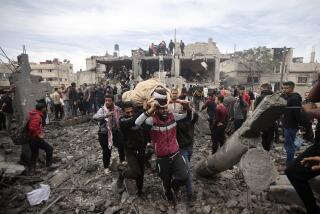NEWS ANALYSIS : Global Powers Once Again Paralyzed by Bosnia Crisis : Balkans: Serbs boast of staring down NATO. World leaders can’t square fear of quagmire with desire to end the killing.
- Share via
SARAJEVO, Bosnia-Herzegovina — After almost 3,000 dead or wounded in Gorazde, after another “safe haven” has been trampled, after NATO’s threat of massive force has thus far produced only limited air strikes, the international community has reverted to fretful paralysis over what to do about Bosnia.
The U.N. Protection Force remains handcuffed by a mandate to keep peace in a country where there is none. Relief organizations still must wheedle and negotiate with the dominant Bosnian Serb rebels to get food, medicine and shelter to the war’s civilian victims.
And the world powers that chose humanitarian intervention over halting the bloodshed when it began are searching for an easy way out of the tragedy that becomes more difficult and costly to rectify with each passing day.
More than two years after the outbreak of the worst violence in Europe since World War II, world leaders still cannot square their fears of being drawn into an endless conflict with a nagging desire to do something to make the killing of innocents stop.
The most dangerous consequence of the Gorazde crisis, which rocketed to the political fore this month, may be the message drawn by the Bosnian Serbs that they can take on the North Atlantic Treaty Organization and win.
Air strikes launched April 10 and 11 were limited displays of the Western alliance’s power. But their intended lesson was grossly distorted by propagandists who mold Serbian public opinion.
Rebel leaders--like the hard-line Bosnian Serb commander Gen. Ratko Mladic, already inflated with overconfidence from having rolled over poorly armed government troops in a lopsided blood bath--now boast of having stared down mighty NATO.
“No one can save us from the Serbs now!” wailed a frightened Muslim woman evacuated from Gorazde to Sarajevo on Monday as part of a U.N.-organized airlift.
The commander of U.N. forces in Bosnia, Lt. Gen. Michael Rose, has invoked a new motto for the peacekeeping mission with his declaration that he has no intention of “bombing our way to peace,” despite the Bosnian Serbs’ lukewarm compliance with a NATO edict to withdraw from around Gorazde.
Cmdr. Eric Chaperon, a U.N. spokesman, said Monday that all Bosnian Serb artillery was believed to have been pulled back 1.9 miles from Gorazde, although he conceded that some Bosnian Serb troops had still not withdrawn.
A further test of Serbian compliance will come tonight when another NATO deadline expires; the rebels are to have moved all of their heavy artillery at least 12 miles from Gorazde by 2:01 a.m. Wednesday (5:01 p.m. today PDT).
There are fears among U.N. officers, Rose included, that the Serbs may simply redeploy the tanks and artillery banished from Gorazde to other vulnerable areas they are known to covet for their emerging state of Greater Serbia.
“If I were Mladic, I’d hit somewhere else fast, as soon as I could get everything moved up there,” one U.N. officer said. He speculated that the next target could be the area around Brcko, which the rebels want to widen the territorial connection between land conquered in eastern Bosnia and in Croatia.
By turning a blind eye to recalcitrant rebels who burned homes and blasted utilities as they beat a grudging retreat, Rose calmed the NATO demand for immediate punishment that would probably lead to an escalated conflict between his 15,000-strong peacekeeping force and the radicalized Serbs. The U.N. Protection Force is deployed to Bosnia for humanitarian purposes only, and any action seen as partial to the government would prompt the Serbs to declare war on the peacekeeping mission.
But some here believe the United Nations is simply postponing the inevitable in refusing to take sides in the deadly conflict, which most world leaders say was provoked by nationalist Serbs.
This week’s meetings in London and Geneva to devise a Western strategy for the Bosnian crisis seem to underscore that there has so far been no consensus or definition of policy and objectives.
Even NATO and the U.N. peacekeeping force have shown themselves at odds over how they should respond to blatant and destabilizing displays of aggression.
When NATO commanders sought to order air strikes against Bosnian Serbs who defied the withdrawal ultimatum Sunday, Yasushi Akashi, the civilian chief of the U.N. Protection Force, rejected the appeal as unnecessary because he had reached separate and more lenient terms for compliance with Bosnian Serb leader Radovan Karadzic.
Akashi also apparently softened the NATO order for Serbs to grant unhindered freedom of movement to U.N. troops and humanitarian organizations, allowing the rebels to resume their harassing insistence on clearance for vehicles, aircraft and aid personnel.
Letting the Bosnian Serbs win their first round with NATO also risks encouraging them to stand tough in future faceoffs, which even the most optimistic U.N. officers are already bracing for.
Western mediators and leaders continue to believe peace talks will one day lead to a negotiated resolution of the war, despite the numerous failed diplomatic initiatives involving the Bosnian Serbs and their allies in Serbia.
With no credible threat of force to stop their advances, and dwindling U.N. options for even maintaining an illusion of keeping the peace, the conflict in Bosnia appears fated to continue with political leaders talking in faraway capitals while their warlords fight on.
More to Read
Sign up for Essential California
The most important California stories and recommendations in your inbox every morning.
You may occasionally receive promotional content from the Los Angeles Times.














